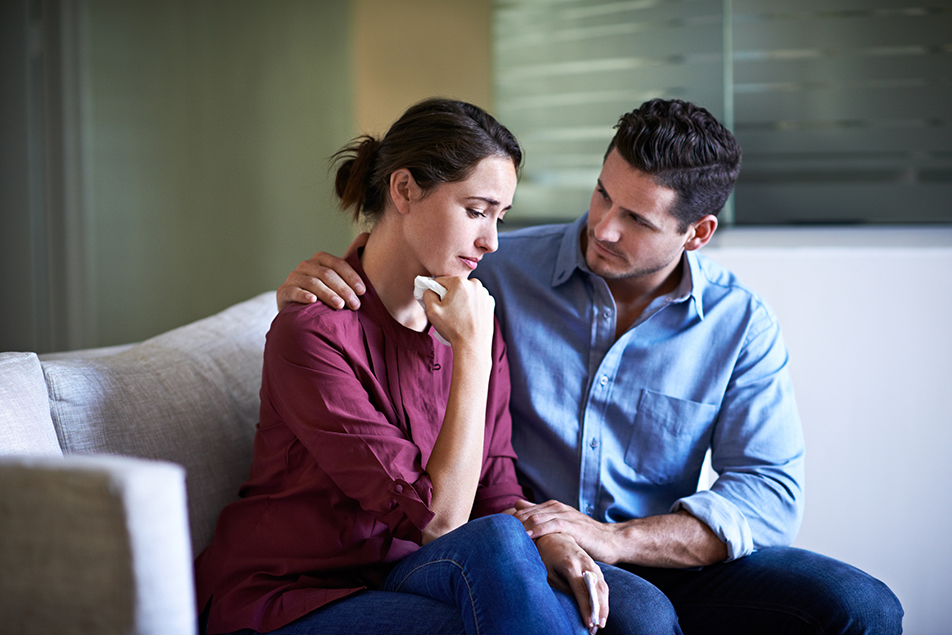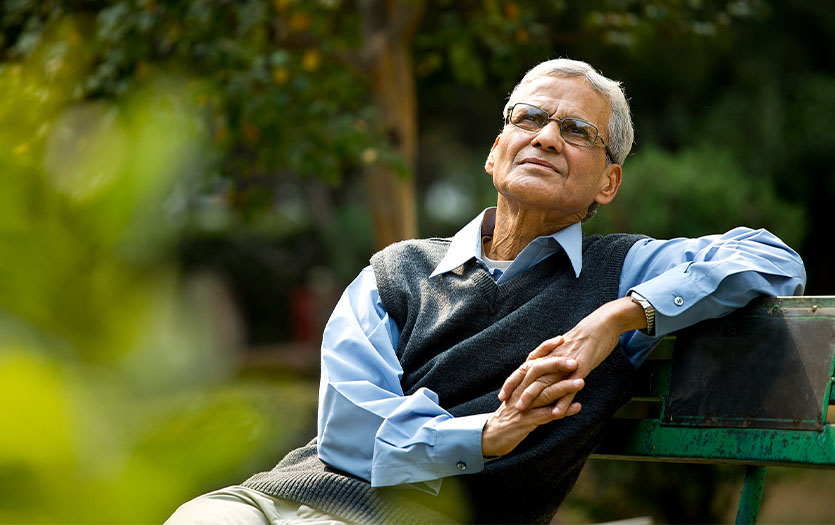Enjoy this monthly post by Patrick Riecke, director, Chaplaincy & Volunteer Services.
It’s very likely you’ve found yourself, perhaps unexpectedly, in the presence of someone who was suffering greatly, and you didn’t know what to say. You didn’t know how to help.
This is one of the most difficult moments we ever face. We care about the person who is experiencing this overwhelming pain, and we naturally want to do something that will help.
Even offering to pray for a person who is in one of these moments can seem a bit like trying to use a wrench when the job calls for a screwdriver—it’s just not the right tool. This has historically been a struggle especially for people of faith like me. We tend to rehash the words we say at other times of life. That can actually hurt our friends who are going through a hard time.
Dangerous Inclinations
Below is a brief discussion of five natural inclinations for those of us who want to help a person in the midst of a difficult time. But they are dangerous for the people we are helping. Perhaps it’s our way to grasp for magic words. If you find yourself alongside someone in a lot of pain, try to avoid these five common mistakes:
1. Defending God
As the leader of a large team of chaplains, I do what leaders usually do. I go to meetings, answer emails, and perform other administrative and leadership tasks. But sometimes, I get the call, and I am intimately involved with the care of a patient or family who is in a dark time.
One such day, one of our chaplains called me because he had been paged to two deaths at the same time. The patients’ rooms on opposite sides of the building and their time of death was almost the same. He was in the ED with one of the families. The other patient had died in our cancer unit, which is near my office.
I offered to see the patient in the cancer unit. I also knew, as all our chaplains know, that deaths in the cancer unit are usually a bit easier from our standpoint. No one expects a person to die in the ED (not even the staff). But the cancer hospital unit is different. Families have had more time to prepare—usually. As such, they know what funeral home they are going to use, the appropriate family is already on site, and they have usually even done some of their grieving before the patient’s death. In this unit death comes as less of a shock … usually.
My visit to this family started out in the usual way. The patient wasn’t old, but wasn’t terribly young either. The family at the bedside shared how long ago the diagnosis had been delivered. They also shared that her husband was on his way—he had not been there at the time of her death.
When he arrived, it became clear that this was not going to be a simple situation after all.
The man’s emotion and volume began to escalate immediately when he entered the room. And he wasn’t just sad. He was angry. Not angry at the staff or me or his family or his wife.
He was angry at God.
He began yelling at the sky. He shook his fist. He sobbed.
“Why, God?” is a question many of us ask during these times. It’s just that most of us keep this question buried in our hearts, making us sick from the inside out.
This man didn’t keep the question inside. He was yelling—loudly. He also didn’t stay inside his wife’s room. He started walking the hall, yelling at God.
I started wishing that I was in the ED with the other family.
Little did I know how difficult this was going to be.
There I was, walking with him up and down the hall of this unit full of other patients and staff while he was screaming at the heavens.
Inside, I felt some responses rising— “Sir, your wife wasn’t elderly, but it seems you had a long life together.” Or, “Your brother-in-law said you have known she had a terminal condition for several months, how can you be so surprised?” But most of all, “God didn’t kill your wife, he gave you your wife for many decades. Cancer is what took her life, not God.”
And, remember, the only thing he knew about me was that my name was Patrick, and I was a chaplain.
So, what did I say to him?
Not much.
I just walked with him, listened to him, and kept saying, “I’m so sorry.”
Why?
Because his question was an emotional one--and quite a natural response. To respond with a logical answer would not have helped him. Perhaps he could have had a logical conversation later. Probably months later. At that time maybe someone could have said some of those things I felt rising inside of me. But twenty minutes after his wife died was not the right time to defend God.
Defending God is one of the natural inclinations at a time like this.
Actually, let me be more honest.
Our inclination is to defend our understanding of God and faith, life and death.
But we have to ask ourselves, “Am I defending God, my faith, my point of view, as a way of helping this person, or justifying my own internal thinking and belief?” If it’s the latter, then we are helping ourselves, not the person in the midst of their dark time.

2. Teaching Theology
Similar to defending God, sometimes we are inclined to teach theology to people who are in pain. We want to tell them what our faith says about times of difficulty, or about how God is good all the time, even when it doesn’t feel that way. These things may be true, but we are making a mistake when we follow this inclination.
Again, their questions at this time are usually emotional, not theological, such as “If God is good, why is he doing this to me?”. When we give a theological answer to an emotional question, we aren’t really communicating. We aren’t really helping.
3. Only focusing on the afterlife
I hope you have never had to go to a funeral where someone stood up and told everyone there not to be sad because the person was in heaven. Even if the family and friends are 100% sure that the person is enjoying an eternal life of extreme bliss, trying to tell someone not to be sad, for any reason, seldom helps them.
For several months, my daughter was plagued by night terrors. Not simply nightmares, but night terrors. If you have ever been around someone having a night terror, you know the difference. It’s like a combination of sleepwalking and a nightmare, and multiplied by ten.
A couple hours after we put her to bed, she would wake up screaming uncontrollably. She would repeat one or two words over and over, usually “Mommy…” followed by another word or phrase. At first, we would try to wake her up and tell her everything was ok. Every time she would call for me or my wife, we would tell her we were there and ask what she needed. We would try to reassure her, and ask her what was wrong. She could never respond to these attempts to communicate.
We bought a camera for her room so we could see what was precipitating these episodes.
The answer—nothing.
She would just wake up with her tears flowing, chin quivering, and flailing about.
When we realized she was having night terrors we changed our approach.
We no longer tried to dialogue with her much. We didn’t get as frustrated with her. We didn’t ask her what was wrong. We just tried to be close to her, give her what she needed, and wait it out. Usually in about ten minutes she would be able to go back to sleep.
Trying to convince my daughter that ‘everything was okay’ during these episodes is similar to trying to tell the grieving that everything is okay because their loved one is in heaven. It might be true, but it’s not helpful.
Notice, the danger here is only focusing on the afterlife. Considering the afterlife is important, but if it is our only tool to try to help someone, we will find that we are not helping that much.
I often speak to groups on these topics. Sometimes those groups are staff at a healthcare agency, sometimes they are community members, and sometimes they are connected with a faith community.
One time while speaking to a group that was mostly comprised of faith leaders, one experienced pastor said something I have heard many times. “I have always seen that Christian people approach death much differently than people with no faith. They have peace and assurance that they are going to be with Jesus.” And while I somewhat wish this was true (as a Christian clergy person), it certainly is not always true. As the leader of the workshop, I didn’t want to shoot down one of the participants.
Fortunately, a couple of my other chaplains were in the room. Jon raised his hand and carefully shared that he found that even people who had great faith seemed to sometimes still be scared to die, and their loved ones were just as sad to see them die.
4. Cheering people up
Again, young people usually understand the emotional nature of difficult times better than the more mature among us. I can remember a young man who was a part of my youth group years ago. When he learned that a good friend’s mom had died, he told us all he just wanted to punch the wall. Then, at the funeral service, he stood with his friend over to the side, just talking. And laughing.
That kind of ebb and flow of emotions is totally natural during dark times.
Don’t try to cheer people up. Just ride the waves of emotion with them.
If they are sad when you are with them, let them be sad. If they are happy don’t try to talk them out of that, either!
5. Praising people for “being strong” or “moving on”
Sometimes at a funeral, the family isn’t crying and seem to be doing better than expected. We can be tempted to think that means they are really strong. We can make mini-heroes out of them.
I can tell you as someone who has often been behind the scenes in situations like this—many times they are medicated so they can make it through a few of the worst days of their life. If not, the adrenaline of the experience of being the family at a funeral can gloss over some of the deeper feelings they face when the crowds are gone.
What do we communicate when we praise people for being strong (i.e., not crying uncontrollably at the funeral)? We are telling them that this is a more appropriate or admirable way to respond when someone dies.
Which it isn’t.
If I die tomorrow, I hope my kids, wife, family, and friends cry uncontrollably at least once or twice!
Not long ago one of my teenage sons was at a party when another boy accidentally pushed a piece of furniture into his bare foot. The result was that the nail on his big toe lifted like a trunk lid, and there was blood everywhere.
When I arrived at the house he was still crying.
And that’s what he should have been doing. He was in pain, and he deserved to cry.
It’s the same with people in emotional pain. It’s totally okay for them to cry and not be strong. And when we praise them for being strong and moving on, we are basically saying, “That’s the preferable response. If you are sad or depressed that is less desirable. It’s more convenient for me if you are less sad, because I am not confronted with as much pain when I think about you.”
Praising people for moving on or being strong is a natural inclination, but it's not helpful.



